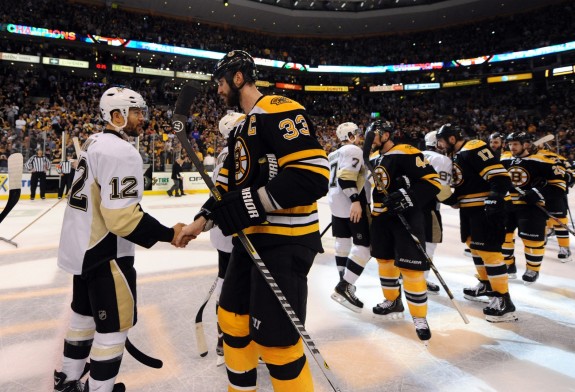If you had to put all your money on correctly guessing the 2013-14 Stanley Cup Champion, your best chance of fortune would be to select the Boston Bruins. That isn’t to say that the Big Bad Bruins are the best team in the NHL, but they have the greatest odds to win it all. It really comes down to a numbers game.
Consider: Who would be your top choice to win the East? Now who’s your top choice to win the West? Was it much harder to select the latter? If not, try again, you’re doing it wrong. The West is filled with potential victors and debate, whereas the Bruins are undeniably favorites to win their conference, and for good reason: Boston took the East, ran away, and hid behind the discarded hopes and dreams of all other EC teams this year. It’s much like the Blackhawks did with the West last year, and look how that worked out for Chicago. It doesn’t matter how great each West team is, in the end there’s just one spot.
Let’s break down the logic and calculate some of the numbers to verify this theory. Which team, if any, is a reasonable choice to beat the Bruins? Let’s run down the list of potential playoff participants.
The East matchups
Penguins: Look no further than last year’s series. Boston’s physical play, defensive prowess, and ability to Brad-Marchand make them an awful matchup for Pittsburgh, whose players have a reputation for losing their composure when held scoreless and are generally thrown off their game. Factor in that the Penguins lost the talent of Brendan Morrow and Jarome Iginla, who traded his Penguins black and gold for the Bruins, uh, black and gold, and they appear even weaker than last year.

Rangers: New York is a small, non-physical team that’s really different than the Rangers from the past few years under John Tortorella. The trade of Ryan Callahan for Martin St. Louis encapsulates their direction. One would have to think that the Bruins would shut down the Rangers flaky offense and just beat the Rangers into oblivion in a seven-game series, though it’s hard to see it going past five (like last year) unless Henrik Lundqvist grows a second head and stands on that one, too.
Flyers: Philadelphia has no advantages over Boston. The Bruins have much better goaltending, are better defensively, have better special teams, and are probably about equal in terms of physicality. Not to mention they have the deep playoff experience (two Finals in the past three seasons) that Philly, and few other teams, seem to have (unless you count Ray Emery’s great viewpoint from the bench in 2013).
Red Wings: Detroit might be the toughest matchup for Boston. They’re a fast, young (never thought I’d say that), energetic team that just could wreak havoc on the Bruins. Boston, whose roster contains many aging veterans, has consistently had difficulty with speedy teams over the years (see: small 24-year-old Gustav Nyquist burning giant 37-year-old Zdeno Chara the other night). The Bruins also have some question marks on defense with Dennis Seidenberg out, including the unproven Kevan Miller, Matt Bartkowski, and Dougie Hamilton. Detroit has solid goaltending with Jimmy Howard as well.
Canadiens: Montreal is another tough matchup for a few reasons: They’re similar to Detroit with the speed/energy, they have the ability to get under the Bruins players’ skin, and it’s impossible to predict what would come from this rivalry series. Either way, everyone who doesn’t support either team is probably hoping to see this matchup because the only guarantee here is that it would be entertaining.
Lightning: Boston is a perfect 4-0-0 against Tampa this season, outscoring them 15-4, which includes two shutouts. If they shutdown Stamkos and Tampa’s power play, it’s game over.
Maple Leafs: If Toronto can make it, which seems highly unlikely, I don’t think there’s a doubt in anyone’s mind who would win that series.
Blue Jackets: The Jackets don’t really hold any advantages over the Bruins, and the season series went 3-0 in favor of the Bruins.
Capitals: There’s really no shot Washington makes it, but a team that relies so heavily on the 4-on-4 overtime points and the shootout, neither of which exist in the postseason, probably won’t fare well.
So now let’s look at the possibilities. If Detroit ends up playing in the Metropolitan Division this postseason (remember, the top wild card spot will play Pittsburgh in round 1), the Bruins will play the Jackets, Leafs, or Caps. They’ll win that series, and then play either the Habs or Bolts who will face in round 1. If Tampa wins their series, it’s smooth sailing for the seaport-city team to the Finals, unless Detroit can beat the Penguins, and Rangers/Flyers. Yes, the playoffs are different from the regular season and can yield any number of results, but it’s the Bruins conference to lose.
The West matchups
Now, moving to the West. Instead of breaking down each team, let’s just look at the possibilities. Realistically, it’s not absurd to think that any team from this conference could make it to the Finals, except probably for the two that will grab a wild card (Wild, Coyotes, and Stars). So that leaves Colorado, San Jose, Anaheim, St. Louis, Los Angeles, and Chicago. Let’s assume that each of those six teams has an equal shot to make the Finals. Depending on matchups, any team can be favored to win their series, so I don’t think anyone would be surprised at any result.
And instead of breaking down each potential series between these teams and the Bruins, let’s look at the record: Boston is a combined 6-3-3 against these teams in the regular season (1-1 in the shootout). Take that for what you will, but it definitely at least shows that the Bruins wouldn’t be overwhelmed. It’s tough to say which matchups would be tough or easy for Boston. A series with St. Louis would feature one team with great goaltending, great team defense, great depth, and a pest you hate, and the other team is the Bruins. A series with Chicago could be a sweep on either end, or it could go the distance. A series with San Jose probably doesn’t exist if the Sharks continue their reputation by failing to reach the Finals despite the talent. You’d have to guess, since it’s undetermined which team Boston would hypothetically play, that the Finals could go either way.

The Odds
If you’re willing to buy that all of those six West teams have an equal shot to win the conference, then that leaves each team with approximately a 17% chance to awkwardly pose around the Clarence S. Campbell Bowl. Back to the East, and we can put a variety of numbers on the Bruins odds to do the same, but let’s go with an even 50%: They may face neither the Habs nor Wings (who are probably their biggest threats) they may face both, or there’s always the chance they choke and lose to another team. But with top-three numbers in both goals for and goals against, is there any team better than the Bruins?
Assuming Boston has a 50% chance to reach the Finals, and those other six teams have a 17% chance, it becomes clear why the Bruins have the greatest odds to hoist the Cup. If you want to believe the idea that the Bruins have essentially a 50-50 shot of beating their undetermined opponent, Boston has a 25% chance to win the Cup while the other six teams each have an 8.5% chance. Do numbers and stats really matter in the playoffs? Perhaps not. But if you believe the logic presented, you better believe the Boston Bruins have the greatest odds to win their second Cup in four years.